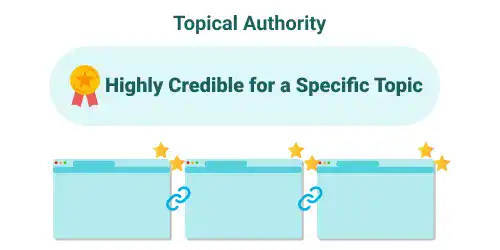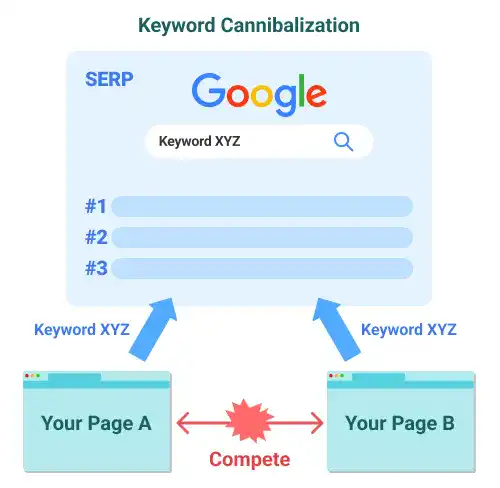Topical Authority and Keyword Cannibalization

When managing multiple web pages, it is crucial to balance building topical authority and avoiding keyword cannibalization. These two aspects are vital for a successful SEO strategy, but they often pose trade-offs.
What is topical authority?
Topical authority refers to a website's (or web page's) credibility and expertise on a specific subject, established through high-quality content. Google emphasizes E-E-A-T (Experience, Expertise, Authoritativeness, and Trustworthiness) in its search-ranking decisions. Therefore, building topical authority is critical in SEO content writing.
To demonstrate E-E-A-T, more than single-page web content may be required. Multiple web pages covering related topics help build topical authority, provided each page contains high-quality content. This comprehensive approach signals to search engines that your site is a valuable resource on a particular subject.
For example, a website dedicated to digital marketing might have multiple pages covering SEO, social media marketing, content marketing, and email marketing. Each page should delve deeply into its respective topic, providing valuable insights and information that establish the site's authority in digital marketing.

To understand topical authority better, refer to these articles.
What is keyword cannibalization?
Keyword cannibalization occurs when multiple web pages on your site compete for the same target keyword. This competition can cause your pages to rank lower in search results, as search engines struggle to determine which page is most relevant for the keyword.
For example, if a digital marketing website has several pages targeting the keyword "SEO strategies," each page might end up competing against the others, diluting their effectiveness and overall ranking potential. Instead of boosting the site's visibility, keyword cannibalization can confuse search engines and lower the rankings of all involved pages.
Having multiple web pages covering related topics helps build topical authority, but you must carefully manage keywords to avoid cannibalization. Here are a few strategies to prevent keyword cannibalization:
- Keyword Mapping: Create a keyword map to ensure each page targets unique primary keywords. This mapping helps distribute keywords across your site, preventing overlap.
- Content Consolidation: If you discover multiple pages targeting the same keyword, consider merging them into a single, comprehensive page. This approach can enhance the page's authority and relevance.
- Internal Linking: Use internal links to connect related content, directing users and search engines to the most relevant page for a particular keyword.

To understand keyword cannibalization better, you can refer to these articles.
Building Topical Authority and Avoiding Keyword Cannibalization
Successfully balancing topical authority and keyword cannibalization involves a strategic content creation and management approach. Here are some tips to achieve this balance:
- Define Clear Content Goals: Before creating new content, define its primary purpose and target audience. Ensure that each piece of content addresses a unique aspect of your topic to avoid overlap.
- Create Comprehensive Content: Aim to create in-depth, comprehensive content that covers a topic thoroughly. This approach builds topical authority and reduces the need for multiple pages targeting similar keywords.
- Utilize Long-Tail Keywords: Long-tail keywords are more specific and less competitive than short-tail keywords. By targeting long-tail keywords, you can reduce the risk of keyword cannibalization while still building topical authority.
- Monitor Performance Metrics: Keep an eye on your site's performance metrics, such as organic traffic, bounce rate, and page rankings. These metrics can provide insights into how well your content strategy works and highlight improvement areas.
- Perform Regular Audits: Regularly audit your content to identify potential keyword cannibalization issues and assess your topical authority. Tools like Ahrefs and SEMrush can help analyze keyword distribution and content performance.
By carefully managing your keywords and creating high-quality, authoritative content, you can enhance your site's SEO performance, improve its rankings, and provide valuable information to your audience. Balancing topical authority and avoiding keyword cannibalization is a continuous process that requires ongoing attention and adjustment. In the next section, we’ll explore specific SEO techniques for organizing multiple web pages: topic clustering and keyword mapping.




